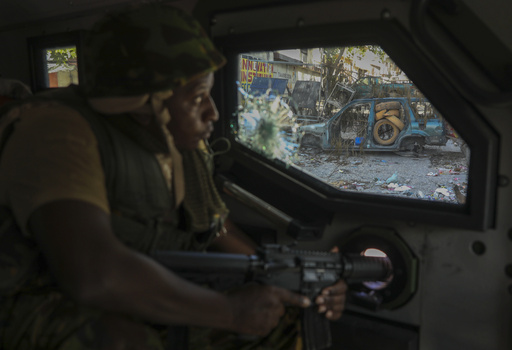
PORT-AU-PRINCE, Haiti — A gang leader purportedly responsible for the deaths of over 100 individuals in Haiti’s capital city continues to terrorize residents, as shared by a rare eyewitness account on Tuesday.
Mackenson Cangé, who lost his father in the violence, informed Magik9 radio that residents in the affected neighborhood reported that armed men were actively pursuing older individuals and harming the youth as well.
“I trust in my country’s justice system. However, I’m exhausted from just hearing the government condemn these horrific acts. We need decisive action,” he remarked.
Details surrounding the recent two-day massacre in Cité Soleil, which took place on Friday and Saturday, remain scarce. Residents have been confined to their homes, and no graphic images of the violence have circulated on social media, which is unusual compared to previous events.
The spokesperson for Haiti’s National Police did not respond to inquiries for comments on Tuesday, nor did the leader of the U.N.-supported mission that includes Kenyan police, which was established earlier this year to combat the escalating gang violence.
For an extended period, law enforcement has struggled to infiltrate gang-controlled territories, and human rights organizations have found it challenging to gather information, primarily relying on terrified locals who are often reluctant to speak due to fear of violent retribution.
According to two local human rights organizations, the death toll from the violence surpasses 100, while Volker Türk, the U.N. high commissioner for human rights, indicated that at least 184 individuals lost their lives during this episode. It remains uncertain how these figures were compiled, as casualty counts in Haiti often fluctuate greatly due to restricted access to affected areas.
The wave of violence is linked to gang leader Micanor Altès, also known as Monel Felix or Wa Mikanò, who reportedly initiated the killings following the illness and subsequent death of his son. This information was provided by the National Human Rights Defense Network and the Cooperative for Peace and Development.
These organizations asserted that Altès accused Vodou leaders and older residents of practices that allegedly caused his son’s suffering.
Haiti’s Office of Citizen Protection condemned the acts of violence on Tuesday, emphasizing that most victims were between the ages of 60 and 80. The ombudsman agency asserted, “Allegations of sorcery do not justify violence or extrajudicial killings. Elderly individuals, who have significantly contributed to society, deserve both respect and protection.”
They urged law enforcement and judicial entities to act swiftly in identifying those responsible for these heinous acts.
The Haitian Bridge Alliance, a nonprofit based in the U.S., also called for a meticulous inquiry on the same day while urging the government to enhance security measures.
“This massacre represents a grievous tragedy that highlights the intensifying crisis of gang-related violence and lawlessness in Haiti,” said Guerline Jozef, the executive director of the alliance.
Altès is known for controlling areas such as Wharf Jérémie, La Saline, and Fort Dimanche where he is infamous for robberies, extortions, and hijacking trucks, as indicated in a U.N. report. Although experts note he has not been as vicious as other Haitian gang leaders.
Cangé expressed that residents from Wharf Jérémie reported that gunmen continue to pursue older individuals while attacking the youth. He recounted the harrowing event where three men came to his father’s home on Friday night, insisting that he accompany them. His father, Marcel Cangé, was readying himself for bed in anticipation of an early church visit when he sought permission to dress properly. He was told that was unnecessary, according to Mackenson.
“I never fathomed such a fate for my father,” Cangé lamented, adding that he had lived in the community for 29 years. “My father was brutally murdered—stabbed and subsequently burned.”
Mackenson Cangé disclosed that he is aware of around 30 others who were also killed during this tragedy. Thankfully, his mother and sister, who resided with his father, managed to survive the ordeal.
“I lost my closest companion, someone who supported me throughout my life,” Cangé reflected solemnly.
Like many regions, the area controlled by gangs remains inaccessible to law enforcement. While the government professes a commitment to deliver justice, the specific plans to achieve that remain unclear.
“A line has been crossed, and the state intends to mobilize all resources to locate and eliminate these criminals,” declared the government in a statement on Monday.
So far this year, reports indicate that over 4,500 people have been killed in Haiti.
